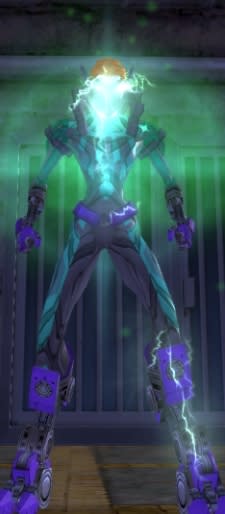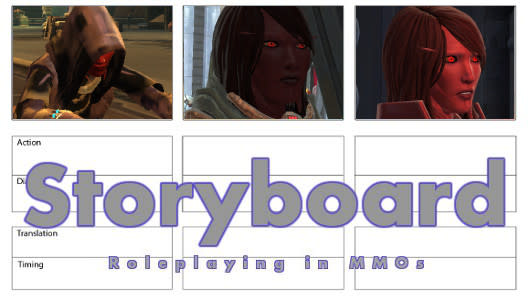Storyboard: Only mostly dead
Dead is dead. I can't stand when comics endlessly bring back dead characters, I can't stand when shows bring back dead villains, and I can't stand when death is treated less like the final note and more like a brief inconvenience. If you want someone to come back from the dead, don't kill the character in the first place! Death needs to be permanent to have any impact.
So this week's article is all about ignoring that and bringing characters back from the dead anyhow because the only reason to have rules is to know when to occasionally break them.
Roleplaying deaths are already rare, of course. I can count how many characters I've actually killed on one hand, and that's stretching back to roleplaying in Final Fantasy XI (abortively). But sometimes you decide that you want someone alive after all. And when it's done carefully, you can actually make the revival interesting again because you're not doing it for shock value so much as making a point.

Figure out the narrative why
The first step, always, is figuring out why the character is coming back. And I sure as heck don't mean the methodology because that's secondary. What does bringing the character back to life actually accomplish?
If the whole point is tying up loose ends, it's probably better to leave the character dead. Death always means loose ends, things that won't be completed, stuff left undone -- that's kind of the point. Reversing death just to trim up some plot points reeks of lazy writing, creating the sort of revolving door environment that's plagued comics for years. Heroic deaths, in particular, are completely robbed of all meaning when people start bouncing back from being dead.
In essence, the best reason to bring someone back is to start playing a new character completely with the added benefits of history and unnerving backstory. Your character's motives and drives are different from what they were pre-death. Goals are new. Everything has changed except for elements like the character's name and face, and that raises all sorts of questions about the differences between the old version and the new version.
But if you're essentially playing a new character, why not just play a completely new character, right? And therein lies the issue. You need to explain both why the character is coming back and why having a character come back is somehow more advantageous than having a completely new character fulfill the same role.
Sometimes, this is entirely the case. But compare and contrast, always. Before bringing back a character that's dead, ask yourself if you're gaining something by having a dead person's face.

Have a method that matters
Let's assume that you've got a good reason. In that case, it's time to go ahead and figure out how the character came back because that should matter. If it doesn't matter, go back a step and re-evaluate because it ought to matter a whole lot.
In World of Warcraft, I brought back a long-time antagonist in the form of a Death Knight. This was important. She wasn't the person she used to be. She'd had a scheme, it failed, and she died. Then she came back through the power of the Lich King, thanks to the efforts of her allies. That meant she had been to Northrend, had heard the whispers of Yogg-Saron, and had understood and assembled a coherent narrative regarding her previous schemes that centered around the Emerald Nightmare.
She'd seen the ruin of her plans the first time around. And that was fine; she wasn't going to try and do the same thing all over again. No, this time she was going to do something much worse because she'd been raised by an entity whose enmity toward life was boundless and she'd internalized the whispers of a deathless creature obsessed with destruction.
If you're bringing back a dead character, you can't just assume that said character didn't die for whatever reason. No, that revival should mean something, should lead into future stories. There should be some sort of overall narrative connecting everything. Otherwise that death is just being functionally retconned out of existence, and you aren't really concerned with why the character died, just that someone who was dead isn't dead any more.
You can make it mysterious, you can make it unusual, or you can make it specific. But make sure that you know why a character came back to life, and more importantly, make sure that the method of revival has some bearing on the character's present.
Do not pick up old arcs
So your dead man is now alive again for reasons that are highly plot-relevant, doing stuff like live people do and only somewhat mystifying the many people who watched him die. But none of that matters. You're in a good space, and now you can pick up all the plot threads you dropped the first time he died...
No. Stop. Rewind. Let those plot threads lie. They're as dead as he used to be.
Even if there's no mystery or ambiguity about coming back to life, your character still died. He was gone. If you're going to violate that rule, the least you can do is make sure that he still feels the impact of that change, starting with the fact that he isn't just picking up where he left off. That old life is gone, too. His friends and family may recognize him, but the life he had isn't there any more.
Yes, you can refer to old stuff. But you shouldn't treat a revival as a chance to just pick up where you left off. Your character is in a new place, dealing with the specter of his old life, trying to figure out how close he is to his old self whilst dealing with the troublesome facts of death and resurrection.
Your character may have a new lease on life, but he can't just walk back into the same spot again. That's not going to work.
Feedback, as always, is welcome in the comments down below or via mail to eliot@massively.com. Next week, let's talk about the roleplaying that happened but also never took place. The week after that, let's talk about manipulation and manipulative characters.

Every Friday, Eliot Lefebvre fills a column up with excellent advice on investing money, writing award-winning novels, and being elected to public office. Then he removes all of that, and you're left with Storyboard, which focuses on roleplaying in MMOs. It won't help you get elected, but it will help you pretend you did. If you need a refresher, check out the Storyboard Library.


